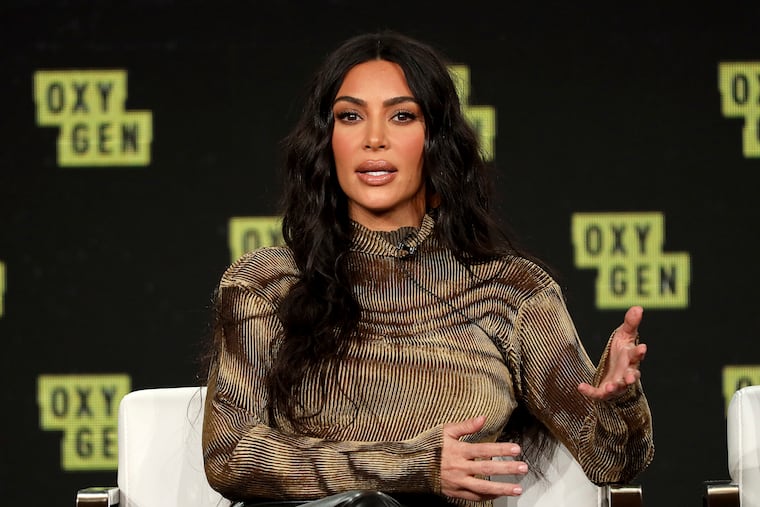What Kim Kardashian’s crypto settlement means for her, according to Philly experts and the numbers
The $1.26 million settlement equals about 2,000 sales of Kardashian’s SKKN skin-care collection.

Kim Kardashian will pay a $1.26 million settlement to the U.S. Securities and Exchange Commission for promoting crypto on her Instagram page without disclosing that she was paid. The agreement — announced Monday morning by the SEC — marks among the most high-profile examples of how federal regulators are working to shut down celebrity endorsements of crypto security.
“This case is a reminder that, when celebrities or influencers endorse investment opportunities, including crypto asset securities, it doesn’t mean that those investment products are right for all investors,” SEC chair Gary Gensler said in a statement. “We encourage investors to consider an investment’s potential risks and opportunities in light of their own financial goals.”
Kardashian promoted the EMAX tokens, sold by EthereumMax, on her Instagram account to her more than 330 million followers in June 2021, in return for $250,000. She included the hashtag #ad with her post, but SEC officials said that’s not enough to comply with laws surrounding financial investments and securities. She did not admit to or deny the SEC’s findings.
» READ MORE: Kim Kardashian settles with the SEC over crypto promotion
The significance of the settlement, according to Philly experts
Kevin Werbach, a professor at the University of Pennsylvania’s Wharton School who designed its Economics of Blockchain and Digital Assets program, said that the SEC targeting Kardashian sends a message to the general public.
“Kardashian is a high-profile figure,” he said. “People will pay attention to an SEC action against a celebrity who essentially admitted that she violated the law. It makes a statement.”
Werbach said the charges and settlement imply that the SEC is concerned over a lack of transparency surrounding endorsements of securities, the legal category of investments the group regulates to protect investors.
“We have investor and consumer protection laws because, time and time again, those groups are taken advantage of by promoters and fraudsters,” he said. “Digital assets are exciting innovations, but when they are promoted as investments, that should involve the same protections that other investors receive.”
» READ MORE: EXPLAINER: How cryptocurrencies work (and how they don't)
He said he believes the SEC will continue to go after influencers who improperly promoted digital assets. Earlier this year, Kardashian and other celebrities including boxer Floyd Mayweather were named as defendants in a class action lawsuit that accused them of artificially inflating the price of EthereumMax. Reese Witherspoon, Gwyneth Paltrow, the D’Amelio sisters and other high-profile stars have been criticized in the past for promoting cryptocurrency without also discussing the risks.
Kardashian’s lawyer said in a statement that the celebrity is glad to “move forward” and “get this matter behind her.” Rowan University finance professor Daniel Folkinshteyn said Kardashian could have easily avoided these charges.
“Practically speaking, all one has to do to avoid violating the laws here is disclose the compensation received in exchange for the promotional activity, so as to not mislead potential investors into thinking that you are providing your own unbiased opinion,” he said.
The significance of the settlement for Kardashian
As part of her settlement, Kardashian can’t promote crypto securities for three years, forfeited the payment she received from EthereumMax, and agreed to pay a $1 million fine. But what does that mean for someone worth an estimated $1.8 billion? Apparently, not much.
We crunched the numbers and figured out what kind of sales Kardashian would have to make to pay off that $1.26 million:
2,000 SKKN by Kim complete skin-care collection bundles, retailing at $575 each.
5,000 pairs of her sister Khloé's Good American jeans, selling for $245 each.
6,300 bottles of her half-sister Kendall Jenner’s 818 Tequila Reserve limited edition batch, priced at $200 each.
703 Balenciaga trash-bag pouches — like the one she was gifted — valued at $1,790 each.
3,150 Yeezy Gap coats valued at $400 each.
1,625 pairs of Christian Louboutin heels, costing $775 each.
About one-and-a-quarter promotional posts for a fast-fashion company on Instagram, valued at $1 million each, but reportedly declined.